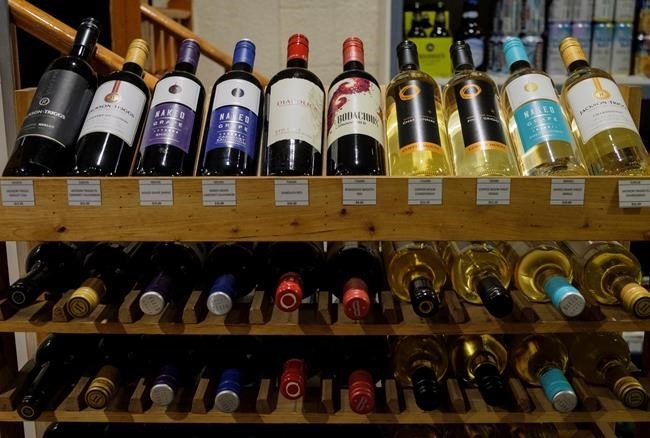
Bottles of British Columbia wine on display at a liquor store in Cremona, Alta., Wednesday, Feb. 7, 2018. An interprovincial wine war is fermenting after Alberta's provincial liquor wholesaler told vintners in British Columbia that it won't stock their products in retail stores unless they stop shipping it directly to consumers. THE CANADIAN PRESS/Jeff McIntosh
Republished January 31, 2024 - 12:11 PM
Original Publication Date January 31, 2024 - 1:06 AM
EDMONTON - An interprovincial wine war is fermenting after Alberta's liquor wholesaler told vintners in British Columbia that it won't stock their products in retail stores unless they stop shipping it directly to consumers.
"They are really making a threat," said Al Hudec, a lawyer hired by winemakers to push back against the Alberta move.
"The B.C. wineries are not breaking any laws in Alberta. This is just muscling the wineries."
Last week, Alberta Gaming, Liquor and Cannabis, which regulates the sale of liquor in the province by controlling wholesale and distribution, sent a letter to wineries in B.C. It said the agency had been investigating the practice of consumers in Alberta ordering wine directly from B.C. wineries instead of buying it in Alberta stores.
"Our investigation found tangible evidence of (your winery's) involvement in (direct-to-consumer) shipping of wines across provincial borders in Alberta," said one of the letters, shared with The Canadian Press.
"To maintain the integrity of Alberta's liquor model and to protect the interests of Alberta retailers and liquor agents, AGLC will not accept any inbound shipments from (your winery) from this date forward. We will resume acceptance of inbound shipments if, by way of written notice, (your winery) agrees to immediately cease (direct-to-consumer) shipping operations to Alberta."
That's corked, said Hudec. He said Alberta is trying to impose its regulations on another province.
"Provinces only have jurisdiction over people in the province and activities in the province. Any enforcement action has always been brought against individual consumers, not the wineries."
What's more, he said the Alberta letter isn't fair.
"(It) alludes vaguely to some breach of the law but they don't give you the particulars. They don't give you a chance to respond, they don't give you a chance for a hearing.
"Then they impose this penalty they don't have any authority under the legislation to impose. It's totally offensive to administrative fairness."
Hudec said the Alberta move could be vulnerable to a judicial review.
B.C.’s Ministry of Public Safety and Solicitor General, in a statement Wednesday, said it was "actively engaging with the government of Alberta to address the issue and navigate shared concerns related to interprovincial direct-to-consumer wine sales for the benefit of the industry and consumers."
John Skinner of Painted Rock winery in Penticton, B.C., said Alberta's move couldn't come at a worse time. Freak cold weather has devastated grapevines throughout the province for a second year in a row.
"The industry is on its heels," he said. "We'd like a little consideration from our provincial friends."
He estimated about 10 per cent of his sales are directly to consumers in Alberta.
"(The move) doesn't represent the Alberta people," he said. "We have a lot of Albertan wine club members."
Wines of British Columbia has written its own letter back to Alberta.
"The letters raise serious concerns for both the individual recipients and for Alberta-British Columbia trade relationships generally," says the Jan. 24 document.
"The AGLC has no authority, within the legislation that it administers, to impose this interprovincial trade restriction."
Karin Campbell, spokeswoman for the Alberta commission, said in an email the agency is trying to protect Albertans.
"Suppliers from other provinces that offer direct-to-consumer shipping are in contravention of provincial legislation, are bypassing Alberta’s private liquor retailers and liquor agencies and are impacting the dollars that go to the general revenue fund," she wrote. "With no oversight, AGLC cannot ensure that these products are being sold only to adults over the age of 18."
Dale Nally, the United Conservative cabinet minister responsible for the agency, did not respond to a request for comment.
B.C., Manitoba, Saskatchewan and Nova Scotia allow consumers to order out-of-province wine directly from producers.
In Manitoba, a 2018 study commissioned by Wines of British Columbia found allowing direct-to-consumer didn't affect retail sales. It found overall wine sales in the province grew faster than the national average after direct sales were allowed.
It estimates direct-to-consumer counts for less than three per cent of wine sales, with most of that involving high-end bottles that aren't even available through government channels.
Direct sales are a long-standing issue for Canadian producers of alcoholic beverages. A 2018 Supreme Court decision found provinces had the right to restrict purchases that didn't go through provincial licensing agencies.
Hudec said that's part of the reason Canadians consume a lower proportion of their own wines than any other wine-producing country.
This report by The Canadian Press was first published Jan. 31, 2024.
Note to readers: This story has been clarified. B.C., Manitoba, Saskatchewan and Nova Scotia allow consumers to order out-of-province wine directly from producers.
News from © The Canadian Press, 2024